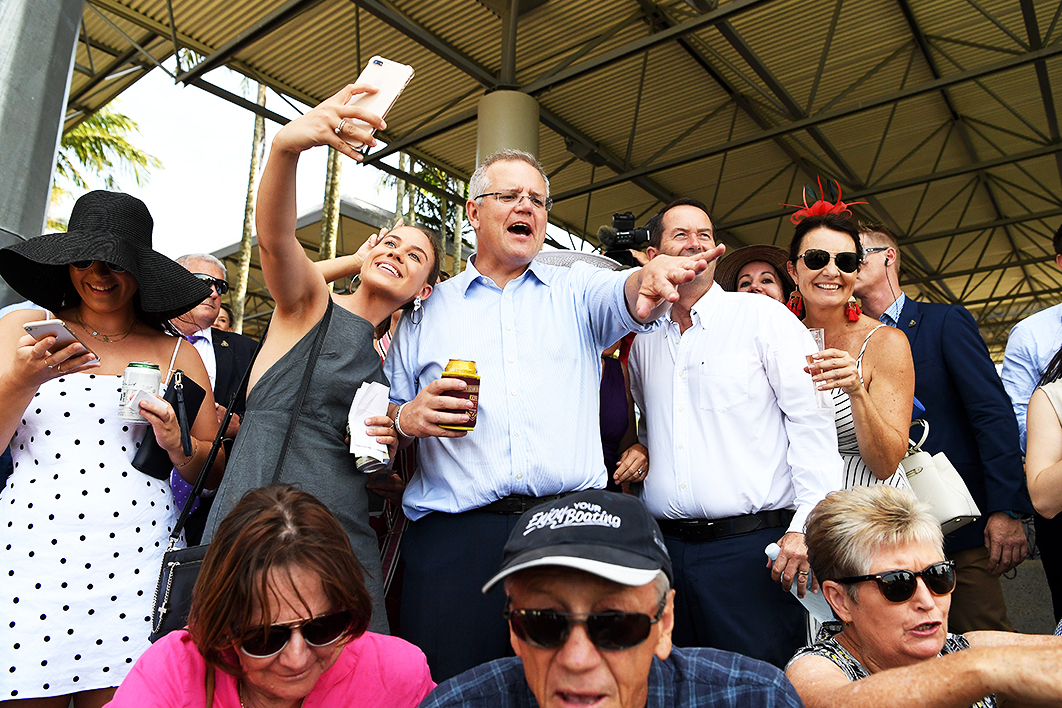For years it was apparent that Scott Morrison was a patient and crafty manipulator of his Liberal party-room colleagues, and in September his manoeuvrings finally got him the ultimate prize.
But it has also long been obvious that his public political skills, in particular his ideas about how voters form impressions of politicians, are third-rate. As treasurer, his repeated attempts to ram himself into middle Australia’s consciousness — those cringe-inducing double thumbs-ups for his footy team, the repeated car-trip analogies — never got him above 5 per cent as preferred Liberal leader.
And as prime minister he’s still at it, trying to connect with his clunky idea of the average Australian family gathered around the telly. With a Pamela Anderson gag on a radio show this week he shifted from daggy dad to skin-crawling territory.
The prime minister who had the worst political judgement in living memory was Julia Gillard. She arrived in the job convinced she would be great at the politics: Labor’s John Howard but with pizzazz, all ridgy-didge values and straight talking and footy. Forget policy, or even moving into the Lodge, charm alone would take her to re-election. Australians would love that package. It was a rapid learning curve.
Malcolm Turnbull’s problem was not with politics per se, but those pesky Earth-bound humans who make up the electoral roll. He just couldn’t get what makes them tick.
Kevin Rudd, on the other hand, had fine political instincts, but they were overwhelmed by fatal personality flaws and, perhaps most importantly, by an inability to transcend a desire for immediate political gratification. Kevin needed approval ratings — now!
Tony Abbott was always a turn-off to electors, but excellent as an opposition leader capitalising on the government’s weaknesses. He was lucky to face a Labor Party, lacking in self-belief, that would dance to his tune.
As prime minister, Abbott didn’t lack policy courage — recall the 2014 budget, which ended up jammed in the Senate, getting more putrid by the day. He also came across as a bit of a weirdo, gave the impression he never bothered much with policy detail, and spent too much time nodding furiously with the creatures on Sky News after dark and assorted radio boofheads in the apparent belief he could narrowcast to the “base” and the rest of the electorate wouldn’t notice.
Morrison, unlike Turnbull, seems caught in that same trap.
But this article is not a lament for the greats of old, because they sure had their share of foibles and mishaps, particularly when they were under pressure. Ultimately, the sheer length of Bob Hawke’s and John Howard’s periods in office produced glossy treatment by political historians. And in both cases their longevity was largely due to circumstances beyond their control, namely the international economy.
Rudd’s first two years saw quite a few stumbles. But because they didn’t seem to dent his opinion poll numbers, they were quickly forgotten. Since 2010, though, our governments have tended to lag badly in opinion polls, and leaders have been under constant threat of losing their jobs.
The culture of the disposable prime minister over the past decade is partly due to the global financial crisis and the sluggish subsequent economic activity, with stubbornly low wage growth. Adding to their troubles is an onerous Senate, much more difficult than Hawke or Howard had to face. Each of the five post-Howard prime ministers could only dream of being able to pass legislation via negotiation with the centrist Democrats. (Gillard could do it with the Greens, but only being able to do things that minor party agreed to was stifling for her government.)
The swelling Senate crossbench is a function of declining support for major parties (accelerated by the global financial crisis), which is also having repercussions in the lower house.
If there is a method to Morrison’s madness, it’s that it’s better to be seen as an annoying try-hard than as a shifty former union wheeler-dealer who played a key role in the disposing of two sitting prime ministers.
Speaking of Bill Shorten, on Wednesday night he tweeted the news that he was holding his seventy-fourth town hall meeting as opposition leader. By all accounts these are his forte. Which is great, but the total number of electors they reach, in the tens of thousands, is a drop in a sixteen-million ocean. The ever-growing number of swingable voters, politically uninterested, still mostly form their impressions from the almost subliminal television clips in which he invariably comes across as over-rehearsed and dripping with insincerity.
That doesn’t mean Labor won’t win the election — we’re talking, remember, about an electorate that consciously made Tony Abbott prime minister. All the polls point to that outcome.
But when Morrison is not being smarmy he does make sure he touches on issues that matter most — issues related to the economy, that is. If the Coalition is to survive the next election, it has to convince voters that the Labor opposition will make a mess of things and it’s better to stick with the devil you know. That seems a hard ask in these post–global financial crisis days, when neither side can claim ownership of economic competence.
But with signs of economic improvement, and with an opposition proudly taking a big suite of policies into the campaign… for some reason the figure of John Hewson keeps coming to mind. •





